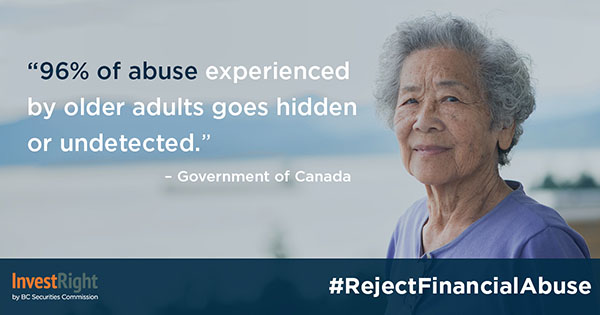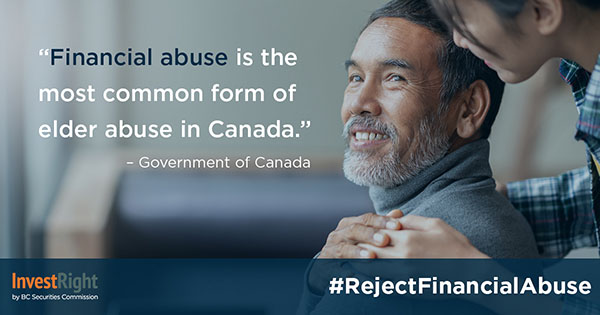Isolated adults are vulnerable to elder financial abuse but conversation can help drive change.
Elder financial abuse is the most common form of elder abuse. It is defined as the unlawful or unauthorized use of an elderly person’s financial assets. It is also the act of pressuring an elder to authorize consent or use of their financial assets.

How to Recognize Elder Financial Abuse
Personal relationships are often leveraged to perpetrate investment fraud. To gain the trust of an older adult, a fraudster will often offer help or become a close friend. Learn more about the ‘trust trap’ and other investment fraud warning signs here.
Fraudsters target older adults because they often have savings: investments, property, pensions, etc. Fraudsters know that older adults may be attracted to high-return, low-risk investment offers, because older adults are often looking to maximize their investments for retirement, or they want to leave money for their children and grandchildren.
Other common examples of elder financial abuse include:
- Theft of money, credit cards, bank cards, and/or possessions.
- Someone attempting to take over an older person’s financial affairs, including their investment portfolio.
- Someone pressuring or forcing an older person to sign legal or financial documents.
- Someone threatening or pressuring an older person to give money.
- Someone not allowing the older person to spend money on what he or she wants.
- Someone attempting or actually persuading, tricking, or threatening the older person to make changes to their will and/or power of attorney.
- Misuse of a power of attorney by engaging in acts that are not in the best interests of the older person.
In the above examples, the abuser can be someone the older person trusts and cares about, such as a family member, caregiver, or friend. This personal relationship makes it difficult for the older person to come forward to get help, especially if they care about the relationship they have with the person who is mistreating them.
Common Warning Signs of Elder Financial Abuse
Financial abuse can be difficult to identify or recognize. It is often a pattern, rather than a single event, happening over a long period of time. When protecting yourself from financial abuse, it’s important to remember that your money property, and investments belong to you.
The following are some common warning signs, also known as the red flags, of elder financial abuse:
- Unusual financial transactions, such as bank withdrawals or the liquidation of investments
- Sudden change in living arrangements.
- Sudden inability to pay bills.
- They are no longer buying things they need, like clothes, groceries, or medications.
- Unexplained disappearances of their valuable possessions, such as jewelry and art.
- Financial responsibility for a family member.
- Unusual fear of or sudden change in feelings about a particular person or people.
- Discrepancy between standard of living and financial assets.
Learn to Reject Elder Financial Abuse
When older adults are isolated, they are more vulnerable to becoming targets of financial abuse. Isolated older people are particularly vulnerable because fraudsters will discourage them to report abuse or suspect investments.
While anyone can be a victim of investment fraud or an unsuitable investment, older adults have less time to recover from a financial loss. A financial loss can also affect an older adult’s health or cause a person to withdraw from friends and family, thereby isolating themselves from important people in their network.
If you feel isolated, you’re not alone. There are many people who can help you protect yourself from financial elder abuse. You can take control and access support.

How to Prevent Elder Financial Abuse
Build your understanding of elder financial abuse and learn to reject and prevent it from happening to you and/or someone you know by:
- Staying informedand talk about financial matters with people or professionals you trust.
- Understanding how fraudsters target seniors and community organizations.
- Investigating an investment opportunityor sales pitch, as well as the person promoting it, before handing over your money; or consider seeking independent, third party advice if you are unsure of an investment offer.
- Understanding affinity fraudand learning the affinity fraud warning signs.
- Learning to identify and avoid investment schemes with BCSC InvestRight’s Seniors and Adults Over 50: Check Before You Invest
- Keeping track of your finances by reviewing your bank and investment statements regularly.
- Discussing future plans with your lawyer and making arrangements in case something happens to you and you are not able to communicate your wishes. This can be done by drafting a will, healthcare directive, and/or power of attorney.
- Getting helpif someone pressures you to invest or asks to access your investment or bank accounts.
- Asking someone you trust for help if you feel a family member, friend, or care worker is pressuring you for money or seeking access to your finances.
How to Report Elder Financial Abuse
Abusive relationships rarely end on their own and they become worse over time. If you think you or someone you are close with are being taken advantage of financially, ask for help.
Everyone has the right to be treated respectfully and to make decisions about their own money.
If you feel that you are being subjected to elder abuse, talk to someone you trust, such as a friend, family member, police officer, lawyer, or staff member at your financial institution.
Sometimes, older adults who are experiencing financial abuse may decline help when offered. This could be because of a number of reasons, including:
- A fear of what will happen to themselves or the abuser.
- Family loyalty.
- They don’t know where they can get help.
If an older person you know declines help with an abusive situation, don’t give up. Support their wishes, reassure them that you are here to help, continue to offer support, provide information, and consult with professionals if necessary. If at any point you are worried about the immediate safety of the older person, contact the police immediately.
Where you can Report Elder Financial Abuse in British Columbia
If you suspect investment fraud, contact the BCSC:
Telephone: 604-899-6854 or 1-800-373-6393 (toll free across Canada)
Email: inquiries@bcsc.bc.ca
If you suspect other forms of financial abuse, these are resources that you can look to for help:
- Seniors Abuse Information Line (SAIL)from Seniors First BC is a resource for older adults to receive general information about elder abuse. It is also a safe contact to discuss possible abuse or mistreatment. BC residents can contact SAIL at 604-437-1940 or 1-866-437-1940 (toll free).
- Government of BC – For protection from elder Abuse or neglect, visit gov.bc.ca/elderabuse.
- Public Guardian and Trustee at 604-660-4444, or visit http://www.trustee.bc.ca/Pages/default.aspx.
- Legal Services Society at 604-408-2172 or toll-free at 1-866-577-2525, or visit https://lss.bc.ca/.
- Contact the RCMP or local police if you feel the abuse is a criminal matter. You can also call VictimLink BCat 1-800-563-0808 to receive information and referral services if you are a victim of a crime.


See all articles by Guest Author



